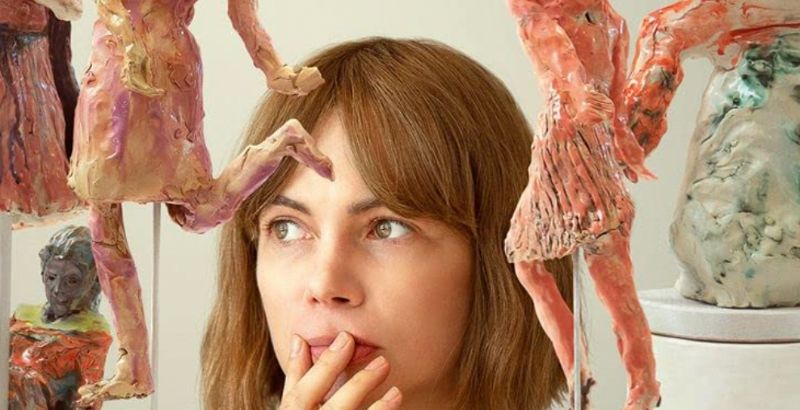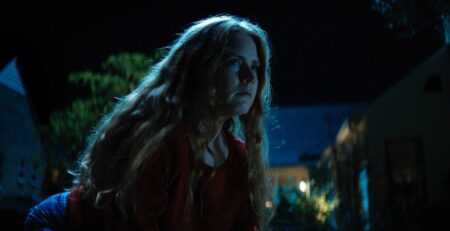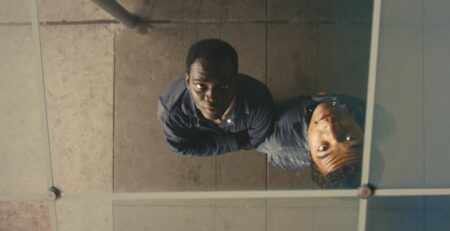
Kelly Reichardt directs and writes, alongside Jonathan Raymond a painfully lethargic art film about exceptionally well-acted, contrived, obnoxious artists in the A24-produced Showing Up. Lizzy, played to lugubrious perfection by Michelle Williams, is a hermetic artist at odds with her artist neighbor and landlord Jo (Hong Chau) over pretty much everything. The hot water is out and Jo won’t do anything about it until her two show openings have passed, and Lizzy just passive-aggressively wishes she could be left alone to get her own show finished in time for a few days after that.
When I say this movie is lethargic, I mean it is truly the most plodding, slowly developing, barely attention-holding trek through about a week or so in Lizzy’s life. She’s a miserable person who you can’t quite fully grasp. She’s a bit self-loathing, a bit self-aggrandizing, and several bits anxious mess. Williams plays this perfectly, making a compelling character out of an awfully mandate screenplay. And the dialogue does just hammer in her disposition again and again through every little retort and a pressurized gasket of hidden fury.
She’s an empathetic character because we watch her employer, who is also her mother (Maryann Plunkett), pay her ceramic passion no mind and express no emotion towards her but judgment. But Lizzy is also quite easy to resent herself. She’s uptight about everything and never grateful to the one solid friend she has in Marlene (Heather Lawless). She’s an impressively constructed and well-acted character.
Between, and sometimes in the middle of scenes, Lizzy’s dimly lit and highly particular artistry will be intercut with Jo’s brighter, more abstract art, or the free-flowing artistry of the school Lizzy works at. While these moments are perhaps meant to show a constant comparison to the way Lizzy takes her work with great seriousness versus the others’ less intense processes, it more so served for me as a gigantic caricature of Portland’s artist community. From the moment Jo, who emblemizes them with her nonchalant attitude and free-flowing style, starts to perturb Lizzy I couldn’t help but feel exactly the way she does about all of them. They are arrogant in their insistence that everything is always fine even when they screw up somebody else’s work, as exemplified astutely by André 3000’s character. And they are generally unbecoming in their eternal lack of noticing others, which Chau at least plays for a good few hard laughs.
Which is why when a small moment here and there demonstrates Jo’s genuine admiration for Lizzy as an artist and her genuinely good intentions it’s all the more aggravating. I want to hate her. I want to hate all of them. I have known so many of this exact kind of person and I loathe them terribly, but to my great chagrin, Reichardt manages to make me, like Lizzy, loathe myself for having felt that way in the first place. Nobody grows or changes in this movie, their dispositions are only heightened as things go on, more interestingly reflected off an injured bird Lizzy and Jo share taking care of throughout the movie even more so than through their sometimes aggravating and always confounding relationship dynamic.
But ultimately, the reason I walked out of Showing Up feeling frustrated is because, for all of the excellent acting and character work, the movie was still painfully difficult to lumber through. It is so, so long for no reason other than to make you sit and wallow in Lizzy’s misery. Her envy, or perhaps the envy I’m projecting onto her, for her inability to just get over herself and be as free-spirited as the rest of the artists around her has all the more time to boil over as you watch Lizzy meticulously work away at her sculptures for drawn out scene after scene. It’s pretty to look at briefly but felt laborious to endure pretty much from the first shot of the movie until the bitter end.
And then when the action does happen, some of the characters, namely Lizzy’s mother, felt so contrived that it ruined the most important scene in the movie. While the climax of the film is happening, she’s leading such an aggravating moment that sucks Lizzy, her brother, and her father into a spiral of irritatingly trite family bickering. This final moment tilted my feelings on this arduously long journey in the wrong direction. I believe Judd Hirsch, who plays Lizzy’s father, offers one of the best and few truly, fully good scenes. But even he, in this final moment, ends up contributing to my malaise.
For every gorgeous piece of production design and interesting thing Showing Up says about relationships, self-loathing, and the free spirit of Portland’s artists, none of that can overcome how painfully drawn out and boring every scene is in between. My substantial appreciation for the characters is retrospective. My feelings in the theater were terse and ended on a quite sour note.
Showing Up is playing now in select theaters.
Showing Up
-
Rating - 6.5/106.5/10
TL;DR
For every interesting thing Showing Up says about relationships, self-loathing, and the free spirit of Portland’s artists, none of that can overcome how painfully drawn out and boring every scene is in between. My substantial appreciation for the characters is retrospective. My feelings in the theater were terse and ended on a quite sour note.




